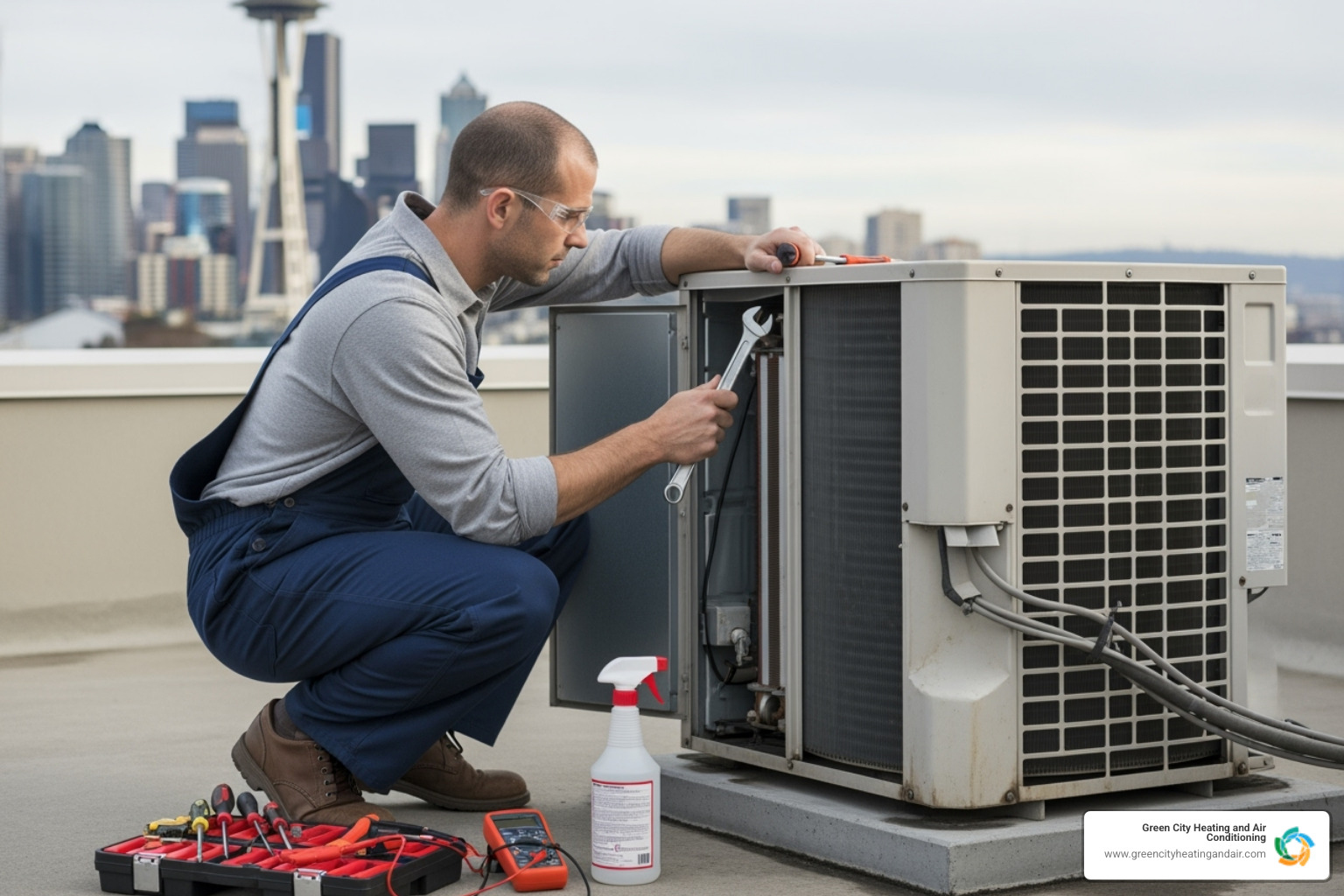When Your Home's Comfort System Fails: Understanding HVAC Emergencies
Emergency HVAC repair is critical when your heating or cooling system fails unexpectedly, especially during extreme weather. Here's what constitutes an HVAC emergency and your immediate action steps:
Critical HVAC Emergency Signs:
- Gas or fuel odors (evacuate immediately)
- Complete system failure during extreme temperatures
- Electrical issues like sparks or smoke
- Water leaks around equipment
- Strange burning smells
Immediate Actions:
- Ensure safety - Turn off power if electrical issues are present
- Call professionals - Contact a 24/7 HVAC service immediately
- Evacuate if needed - Leave the area for gas smells
- Document the problem - Note symptoms for the technician
When your furnace stops on the coldest night of winter or your AC fails during a Pacific Northwest heatwave, you're facing more than discomfort. HVAC emergencies can pose serious health risks and cause expensive property damage if not addressed quickly.
With nearly 90% of homes relying on HVAC systems, failures are highly disruptive. Most breakdowns occur during peak usage periods—exactly when you need your system most.
This guide will help you recognize true HVAC emergencies, take proper safety measures, and find reliable repair services in King and Pierce Counties. We'll also cover prevention strategies to avoid future emergencies.
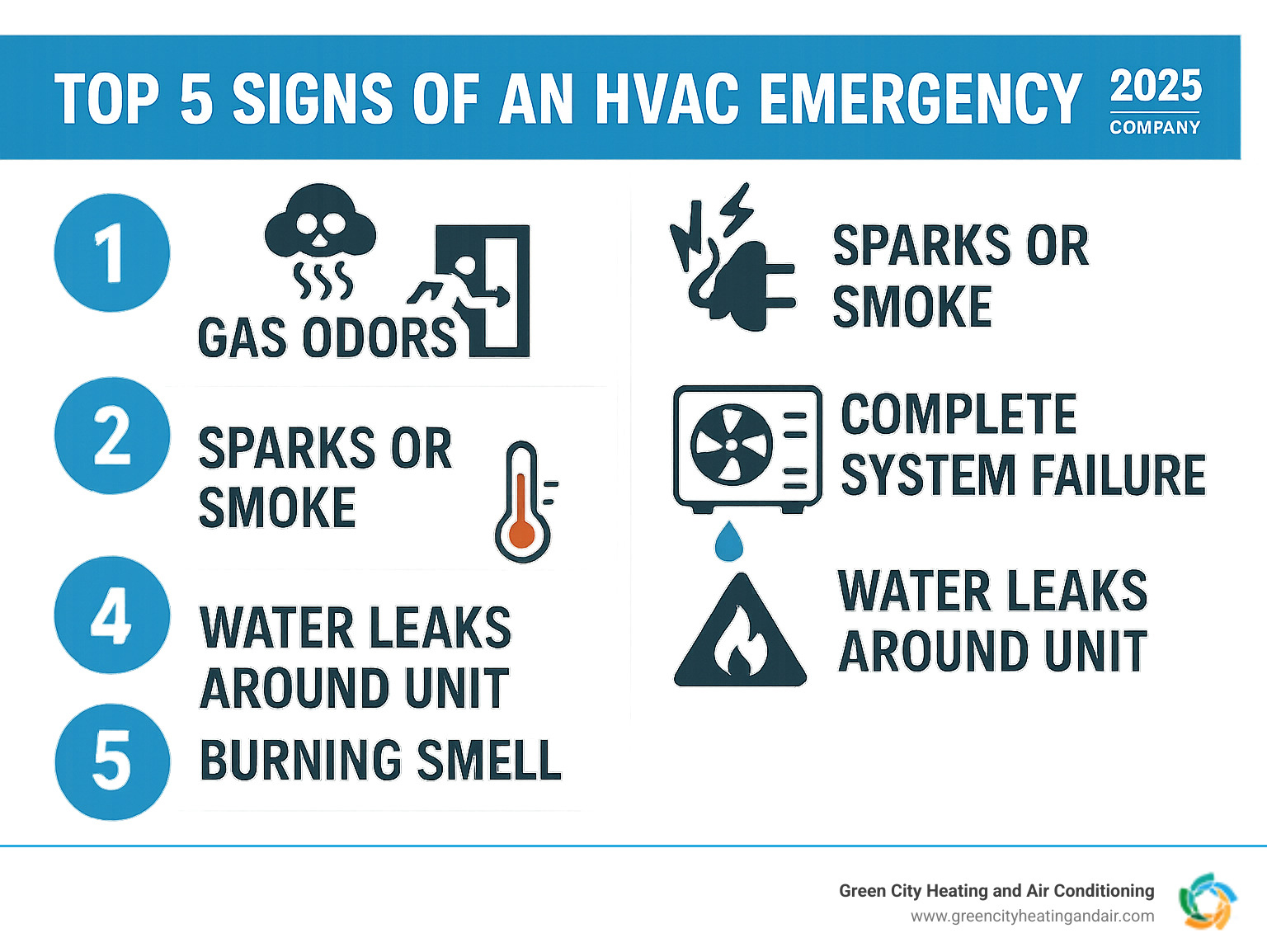
Is It an Emergency? Recognizing the Red Flags
It's 2 AM on a freezing night, and your furnace goes silent. Before you panic, it's important to know that not every HVAC issue requires an emergency HVAC repair call, but some situations absolutely cannot wait. Knowing the difference between an inconvenience and a danger is key. Some problems pose real threats to your family's safety and your home's integrity, and understanding these red flags can save you from costly damage—and potentially save lives.
Critical HVAC Emergency Scenarios
Some HVAC situations demand immediate action for your family's safety.
Gas or fuel smells are a top priority. If you smell rotten eggs (natural gas) or heating oil, evacuate everyone immediately. Don't use light switches, phones, or start your car in the garage. Once safely outside, call for help. Gas leaks can lead to explosions, making this the most serious HVAC emergency. You can learn more about the danger of gas leaks to better protect your family.
Electrical problems like sparks, smoke, or burning smells from your HVAC system are serious. This equipment uses a lot of electricity, and malfunctions can start fires quickly. If you see sparks or smell something burning, shut off power at the breaker box right away and call for emergency HVAC repair.
In the Pacific Northwest, complete system failures during extreme weather become emergencies fast. When winter temperatures drop below 50°F and your heat fails, pipes can freeze and burst, causing thousands in water damage. Your family's health is also at risk, especially young children, the elderly, or those with health conditions.
Summer heat waves create their own emergencies. When indoor temperatures climb above 95°F and your AC fails, heat-related illness is a real concern. Babies and seniors are particularly vulnerable, but even healthy adults can suffer. Some pets can't survive in temperatures above 82°F.
Water leaks around your HVAC equipment might seem minor, but they can signal major problems. A small drip can become a flood, damaging your home and creating conditions for mold. Water and electricity also create potential shock hazards.
Vulnerable family members change the equation. If you care for infants, the elderly, or anyone with chronic health conditions, even minor HVAC problems become urgent because their bodies can't regulate temperature as effectively.
Warning Signs Your System Needs Emergency Repair
Your HVAC system usually gives you warning signs before it completely fails. Learning to recognize these red flags can help you catch problems before they become full-blown emergencies.
Strange noises like grinding, banging, or squealing mean something's wrong, often failing mechanical parts. Ignoring them leads to more expensive repairs.
Unusual odors besides gas also signal trouble. A burning plastic smell suggests an electrical fire hazard. Musty odors often point to mold in your ducts or equipment.
Weak or missing airflow means your system is struggling. The cause could be a failing blower motor, blocked ducts, or a clogged filter, leading to a complete breakdown.
Thermostat problems like unresponsiveness or incorrect readings put serious stress on your equipment. Thermostat malfunctions cause about 40% of all no-cooling service calls.
Short cycling—when your system turns on and off rapidly—is very concerning. It wears out equipment fast and often signals electrical problems or a failing compressor.
Ice formation on your AC unit's coils in summer is never normal. It usually means dirty coils, blocked airflow, or refrigerant leaks. Left alone, ice can destroy your compressor, the most expensive part to replace.
Recognizing these warning signs early gives you the best chance of avoiding a true emergency HVAC repair situation. When in doubt, it's always better to have a professional take a look before a small problem becomes a big, expensive emergency.
Your Immediate Action Plan: Safety and First Steps
When your HVAC system fails, it's easy to feel overwhelmed. However, a clear action plan for an emergency HVAC repair helps you protect your family and minimize damage. Staying calm and prioritizing safety can make the difference between a manageable repair and a costly disaster.
Prioritizing Safety for Your Family and Pets
Before troubleshooting, secure your family's safety. In stressful moments, it's easy to forget these basics.
If you smell gas, evacuate immediately. Don't use light switches or phones inside. Get everyone (including pets) outside and call emergency services from a safe distance.
For electrical issues like sparks or smoke, shut off power to your HVAC system at the circuit breaker right away. Find your electrical panel, look for the labeled breaker, and flip it to "off".
Keep children and pets away from the malfunctioning unit. A broken system can have sharp edges, hot surfaces, or exposed wiring. Create a safe zone around the equipment.
If it's safe to do so (meaning no gas smells), opening windows and doors can help manage indoor temperatures and improve air circulation while you wait for professional help.
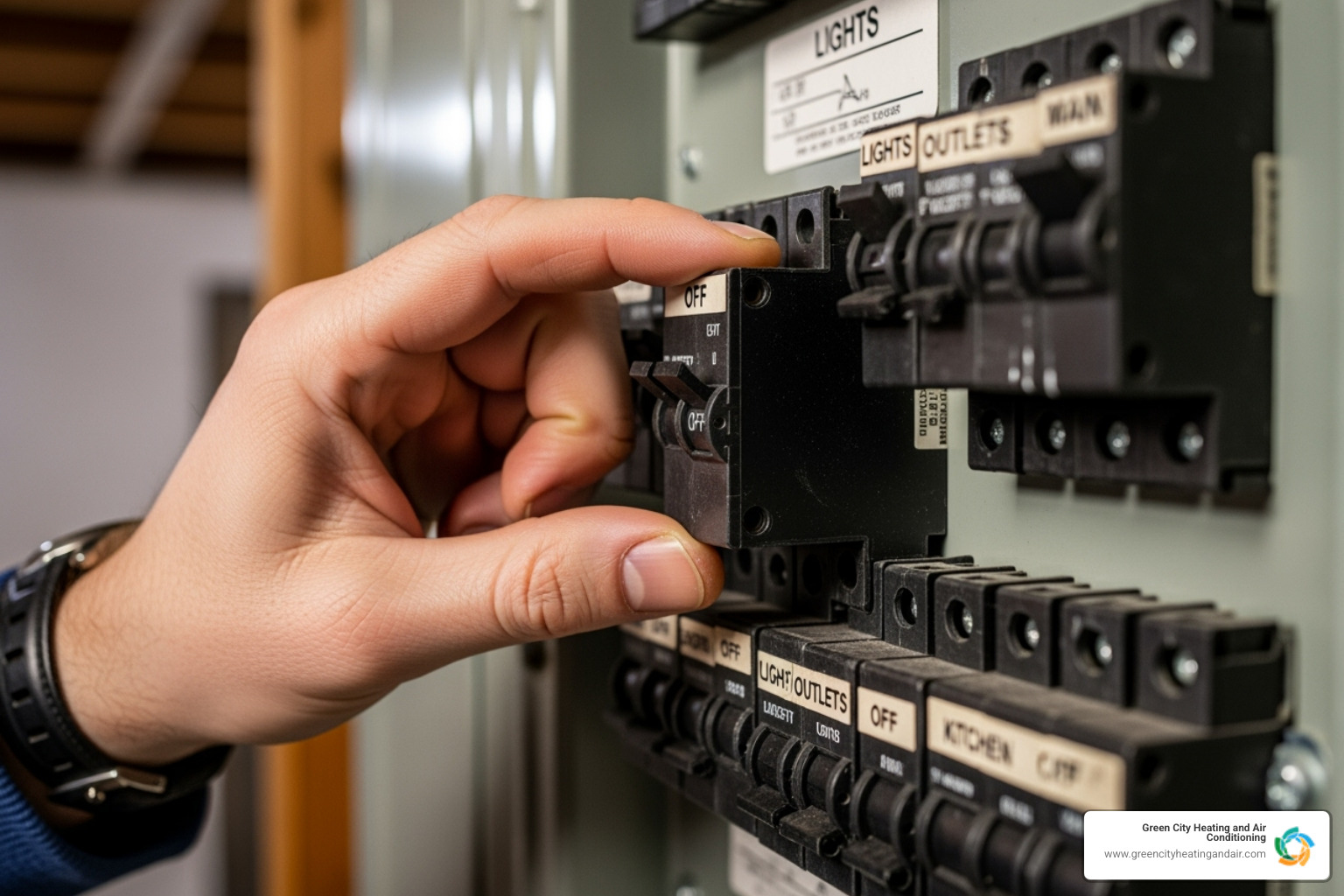
Temporary Fixes While You Wait (and What to Avoid)
While waiting for emergency HVAC repair service, you can safely check a few things. This is detective work to gather clues for your technician, not to perform major repairs.
Start with your thermostat. Often, an "emergency" is just a thermostat with dead batteries or the wrong setting. Ensure it's set to heat or cool as needed.
Check your air filter next. A severely clogged filter can cause a system shutdown. If it's dirty, replace it. This simple step resolves about 20% of problems.
Try resetting your circuit breaker. Power surges can trip it. Find your panel, flip the HVAC breaker completely off, then firmly back to "on." Wait a few minutes before testing your system.
Clear any obvious obstructions around your outdoor unit, like leaves or debris.
While you wait, focus on staying comfortable. In hot weather, close blinds and use fans. During cold spells, layer up and gather in one room. For more ideas, check out these tips for staying warm without heat.
Here's what you should absolutely avoid: Don't attempt electrical work beyond flipping breakers, repair refrigerant or gas lines, or remove equipment panels. These jobs require specialized training. DIY repairs can void your warranty, create safety hazards, and often lead to more expensive damage.
Finding and Hiring a Professional for Emergency HVAC Repair
When your HVAC system fails in extreme weather, you need a reliable contractor immediately. You don't have time to shop around, but knowing what to look for helps you make a smart decision under pressure.
How to Choose the Right 24/7 HVAC Service
Finding the right partner for emergency HVAC repair isn't a guessing game. Knowing which qualities separate professional services from the rest will help you, even when you're stressed.
Licensed and insured should be your top priority. This is your protection if something goes wrong during the repair. A reputable company will gladly provide proof.
Your local reputation matters, especially in King, Pierce, and Snohomish Counties. A company serving your neighbors understands our unique climate challenges. As a family-owned business with over 30 years of experience in these communities, we've seen it all.
Positive online reviews tell you a lot. Look beyond star ratings to comments about response times, how technicians handled emergencies, and fair pricing.
Look for true 24/7 availability, not just an answering service. True emergency service means having technicians on call, ready to head to your home when disaster strikes.
Transparent pricing is essential during an emergency. Reputable companies provide clear, written estimates before starting work. A demand for upfront payment without an explanation is a red flag.
We're proud of our no subcontracting policy. When you call us, a skilled technician from our team arrives. This ensures consistent quality, accountability, and a commitment to our reputation.

Key Questions to Ask Your Technician
When you call, ask these key questions to avoid headaches later. Professional companies expect them.
Response time: How soon can a technician arrive? A good company provides a realistic timeframe.
After-hours and emergency fees: What are the additional charges for nights, weekends, or holidays? Get this information upfront to avoid surprises.
Diagnostic process: How will the technician determine the problem?
Written estimates: Will I receive a written estimate before work begins? This is essential.
Parts availability: Do technicians carry common parts on their trucks for faster repairs?
Warranties on repairs: What kind of guarantee is offered on parts and labor?
Brand expertise: Mention your system's make and model to help the technician prepare.
Understanding the Costs of an Emergency HVAC Repair
Understanding emergency HVAC repair costs helps you budget and avoid surprises during a stressful time.
Diagnostic fees cover the technician's time and expertise to assess the problem before repairs begin.
After-hours and holiday rates are higher to compensate technicians for being available outside of normal business hours.
The cost of parts and labor is the bulk of the bill. The price depends on the complexity of the repair and the specific components needed.
With older systems, you may need to discuss repair versus replacement costs. A major repair on an old furnace might be less cost-effective than investing in a new system. A good technician will help you weigh these options without pressure.
We know unexpected repairs can strain a budget, which is why we offer flexible financing options to make them more manageable.
Ignoring an HVAC emergency usually makes it more expensive, as small problems can escalate into major system failures.
The Best Defense: Preventing Future HVAC Emergencies
Nobody wants a middle-of-the-night emergency HVAC repair call. The good news is that most HVAC emergencies are preventable. Your system works hard and needs regular attention to stay reliable. A small investment in preventive care can save you from costly emergency repairs and provide peace of mind.
The Power of Regular HVAC Maintenance
Regular maintenance is your best insurance policy against HVAC emergencies. An annual tune-up can prevent a major breakdown that leaves your family uncomfortable and facing expensive repairs.
Annual tune-ups are the foundation of good HVAC care. We recommend scheduling heating maintenance in the fall and AC service in the spring. This ensures your equipment is ready for peak seasons and allows technicians to catch small issues before they become big problems.
Professional cleaning and maintenance goes beyond DIY. We clean critical components like evaporator and condenser coils. When dirty, your system works harder, leading to higher energy bills and increased wear.
Checking refrigerant levels is another crucial part of maintenance. Low refrigerant usually means there's a leak. Finding and fixing leaks early can prevent expensive compressor damage.
The benefits go beyond preventing emergencies, including lower energy bills, a longer equipment lifespan, and better indoor air quality. For more insight, check out the value of preventative maintenance.
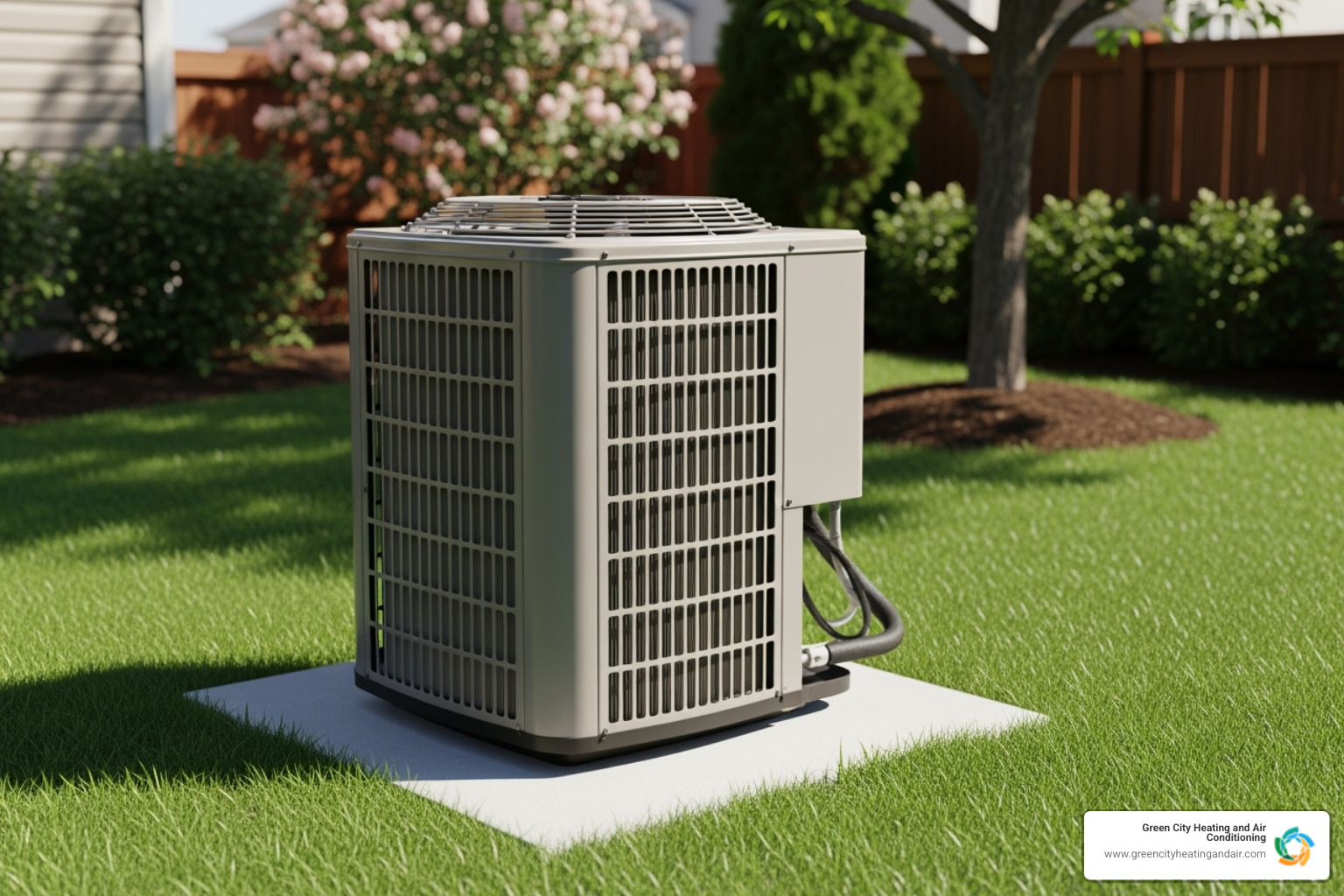
How to Prepare Your Home for a Potential Emergency
Even with great maintenance, issues can occur. Being prepared helps you handle them smoothly.
Know your system's key components. Take a few minutes to locate your thermostat, outdoor unit, circuit breaker, and emergency shut-off valves. This knowledge is invaluable during an emergency.
Keep detailed maintenance records accessible. A history of your system's service helps our technicians diagnose issues more quickly.
Save our contact information where you can find it quickly, like in your phone or near your thermostat. You won't waste time searching during an emergency.
Consider a smart thermostat for better monitoring. These devices can alert you to potential problems and track performance, often providing early warnings that help prevent emergencies.
HVAC systems in King, Pierce, and Snohomish Counties face unique climate challenges. Proper preparation and maintenance will keep your family comfortable and help you avoid the stress of unexpected breakdowns.
Frequently Asked Questions about Emergency HVAC Repair
When your HVAC system fails, you'll have questions. With over 30 years of serving King, Pierce, and Snohomish Counties, we've compiled the most common concerns we hear during these stressful moments.
What is the average response time for an emergency HVAC call?
Response times for emergency HVAC repair vary, but a reputable company with true 24/7 service should aim to arrive within a few hours. Factors include staffing, current demand, and whether they have technicians on call versus an answering service. During peak seasons like heatwaves or cold snaps, wait times increase. The key is choosing a company with real 24/7 availability, not just a message-taking service that can't help at 2 AM.
Can a clogged air filter really cause an HVAC emergency?
Yes, a severely clogged air filter can cause an emergency. It restricts airflow, forcing your system to overwork. For heating systems, this can cause the heat exchanger to overheat and shut down. For air conditioning, it can make the evaporator coil freeze, leading to expensive compressor damage. This is highly preventable: simply checking and replacing your air filter every 1-3 months. For guidance, check out this resource on how to clean an AC filter.
Is it more expensive to repair an HVAC system at night or on a weekend?
Yes, emergency HVAC repair typically costs more during off-hours like evenings, weekends, and holidays. These after-hours fees cover the real costs of 24/7 service, including overtime pay for on-call technicians. A reputable company will always explain these fees upfront when you call so there are no surprises. While no one likes paying extra, the value is clear when you need immediate help. Always ask about emergency fees when you call to understand the total investment.
Conclusion: Restoring Your Comfort and Peace of Mind
When your HVAC system fails, it's easy to feel overwhelmed. But now you have the knowledge to handle any emergency HVAC repair with confidence. The key is to stay calm, recognize the warning signs, act safely, and call a professional to restore your comfort.
This guide is your emergency playbook. You now know when to evacuate, shut off power, or call for help. These steps ensure your home remains a safe, comfortable haven your family deserves.
Prevention truly is your best friend when it comes to HVAC emergencies. Regular maintenance isn't just about avoiding breakdowns - it's about peace of mind. When you invest in annual tune-ups, you're investing in your family's comfort.
At Green City Heating and Air Conditioning, we know emergency HVAC repair calls happen at the worst times. As a local, family-owned business serving King, Pierce, and Snohomish Counties for over 30 years, we're there when you need us most. We never subcontract, ensuring you get a loyal, skilled crew member from our team who understands our Pacific Northwest climate and is invested in your comfort.
If your system is beyond repair or you're ready for an upgrade, we can help. Learn about our heat pump installation services in Seattle to see how a modern system can improve comfort and reduce energy costs.
Every HVAC emergency is temporary, but the peace of mind that comes from working with the right professionals lasts long after your system is running smoothly again.
More Blogs
Latest
insights and tips
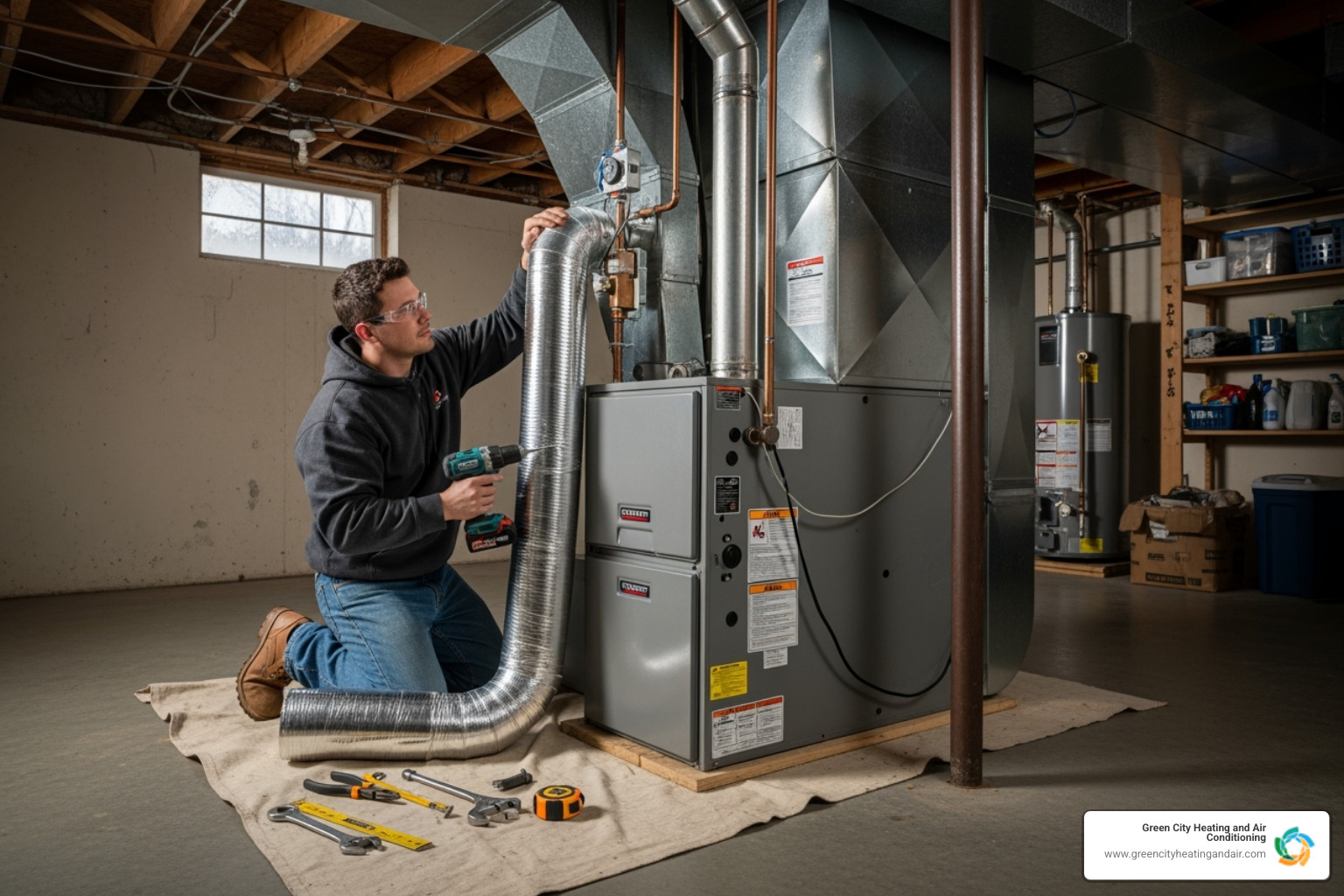
Warmth Unleashed: The Ultimate Seattle Furnace Installation Handbook
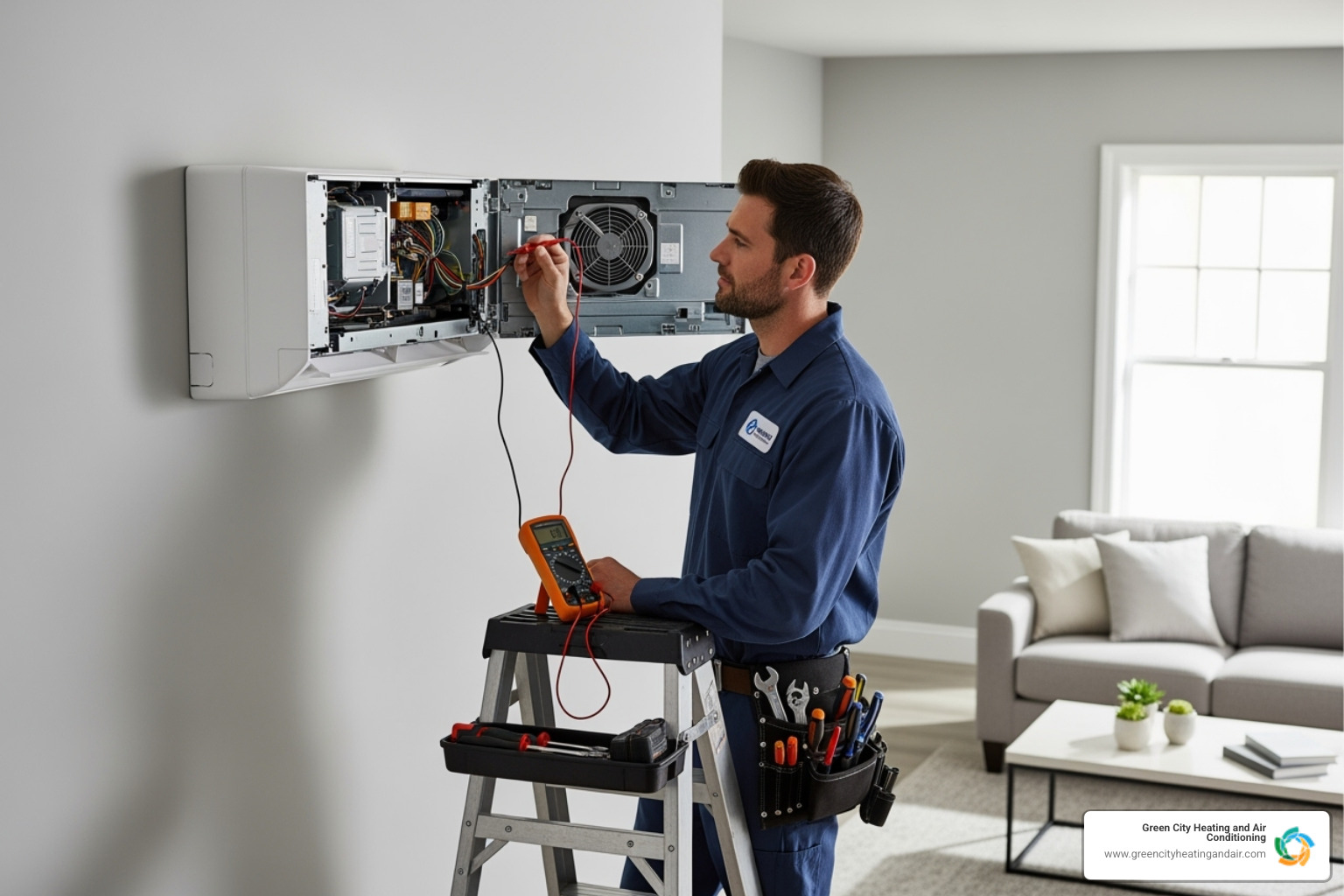
Emergency Ductless AC Repair in Bellevue: Get Your Cool Back Fast
